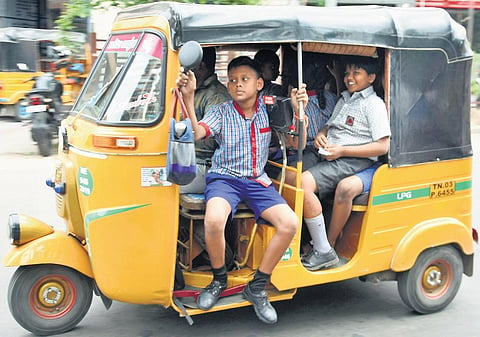

CHENNAI: Last month, 10 school children were injured when a car rammed into an auto the kids were travelling near Madurantakam on Chennai’s outskirts.
Despite the high number of fatalities (TN recorded 15,384 casualties in 14,747 accidents in 2021 as per National Crime Records Bureau), road safety has not received due attention, and children, being the most vulnerable, often find themselves in life-threatening situations. For example, children travelling to schools in crowded auto rickshaws that lack safety features like doors or grilles, with their bags dangling out is common sight on any road across the state.
In the aftermath of the Madurantakam accident, TNIE visited school zones in Chennai and it was found that many of the autos carried three children, well within the vehicle capacity. But a few autos carried up to 10 children. Over-crowding was more common during evening hours as most parents will be at their workplace.
S Ravi, a parent from Korattur, said, “Recently I spotted eight to nine children along with my daughter crammed into an autorickshaw while she was returning from school. When questioned, the auto driver said they earn an average of Rs 20-30 per child per trip, which was insufficient to run their families.
K Rajendran, a state government employee from Thiruvanmiyur said, many private schools discontinued van/bus services as rules were tightened after the 2012 Selaiyur accident in which a six-year-old girl fell through a hole in the floor of the school bus and was run over,
“Most old auto rickshaws do not have doors on both sides. I expressed willingness to pay if the school operated cab, but the management said I should take responsibility for picking up and dropping off my child.”
Lack of school buses or high fees is a major issue that forces parents to depend on autos. D Kalpana, a parent from Peelamedu, Coimbatore, told TNIE, “My daughter studies in a private school on Kalapatti Road. The school charges Rs 25,000 per year for transport. For auto, I pay only Rs 10,000, which is affordable.”
Ravi, an auto driver, told TNIE that they cannot afford to carry just three children due to the high fuel cost. “If we were to take three children, parents must pay Rs 3,000 which is not possible. So I take eight children,” he reasoned.
In Coimbatore, overloaded autos are common on Avinashi, Mettupalayam, Tiruchy, Pollachi, and Thadagam roads.
Ayyarappan, a social activist from Tiruchy, told TNIE, “Despite repeated circulars from district administration, the condition remains
unchanged. In Melaputhur - Cantonment, Thiruvanaikovil, Srirangam, and Chindamani we can see autos carrying school children in large numbers.”
S Arumainathan, state president of Tamil Nadu Students Teachers Welfare Association told TNIE, “Auto drivers’ target is to earn at least Rs 15,000 per month from school rides. If parents pay more, they carry in a limited capacity. But not many can afford that. Auto drivers carry more children by charging less. A committee comprising parents, teachers, and officials needs to be constituted at the school level to ensure a mechanism is in place to check rented vehicles.”
What rules say
According to Tamil Nadu Motor Vehicles (TNMV) special rules, school vehicles can carry only 1.5 times their designated capacity if they transport children under the age of 12. For students above 12 years of age, the vehicle should not carry more people than the seating capacity.
Officials from transport and traffic (police) say they conduct checks regularly during peak hours and impose penalties on violators. “Overcrowding of children has come down significantly across Chennai. However, it remains a problem during the evenings as some drivers carry more children. We will look into it,” said a transport official.
While strict regulations are followed for issuing fitness certificates to school buses, there are no such regulations for auto rickshaws and maxi cabs which carry more schoolkids. Maxi cabs, which are registered as goods carriages, are operated as share autos without permit, which compounds safety concerns.
Talking about the issue, a retired traffic police officer in Chennai said until recently, dedicated inspections were conducted to check for overloading. During these checks, if an auto was found violating a rule, the police would book the driver and a fine would be collected.
“If the same person is caught the second time, the fine would increase. This ensured that auto drivers followed the rules. But in the last few months, there have been no such checks. The focus has shifted to drunk driving and other things,” he said.
Not just private vehicles, even state transport corporations like the Metropolitan Transport Corporation (MTC) which transports 4.5 lakh school children daily, also has failed to meet the safety norms. During peak hours, due to shortage of buses, school children are often forced to travel on the footboards.
Experts contend that this is not monitored and call for a special mechanism needs to be put in place.
(With inputs from Coimbatore and Tiruchy)